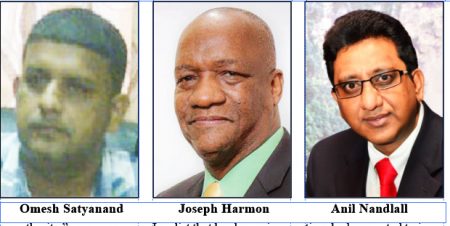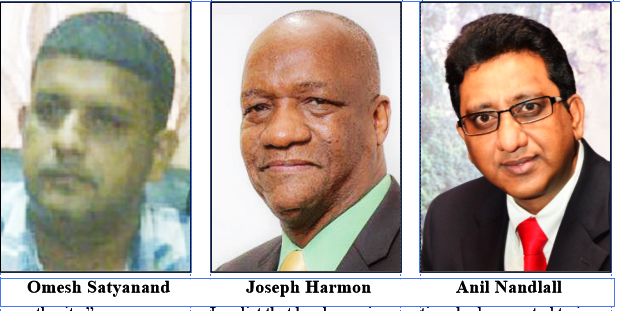Although President David Granger’s recent directive to the Police Service Com-mission to halt its consideration of promotions is unconstitutional, Chairman Omesh Satyanand yesterday said that some members of the body have decided to comply.
“It was put on hold until further notice but it is unconstitutional,” Satyanand told Stabroek News, after he was asked whether the president has the authority to issue such a directive and the commission’s intended course of action. He explained that because of the letter containing the directive, “some of members have decided to put it on hold… .”
The Office of the Leader of the Opposition last Tuesday highlighted the directive, which was issued through a letter, dated July 26, 2017, by State Minister Joseph Harmon to Marvalyn Stephens, the Secretary of the Police Service Com-mission. It stated, “His Excellency, President David Granger has directed that there be no consideration of promotions for members of the Guyana Police Force by the Police Service Commission until further notice.”
Opposition Member of Parliament and former Attorney General Anil Nandlall has since signaled his intention to file legal proceedings if the directive is not withdrawn.
 Satyanand stated that based on the contents of Article 226 of the Constitution, the directive is unconstitutional but some members complied with it since it was the president who had made the request.
Satyanand stated that based on the contents of Article 226 of the Constitution, the directive is unconstitutional but some members complied with it since it was the president who had made the request.
Article 226 (1) states, “save as otherwise provided in this Constitution, in the exercise of its functions under this Constitution, a Commission shall not be subject to the direction or control of any other person or authority.”
He said his position would change only if there is anything in the constitution which states otherwise.
According to Article 226 (3), “Any question for decision by a Commission shall be determined by a majority of the votes of the members of the Commission present and voting at a meeting of the Commission at which a quorum is present, and if on any question the votes are equally divided, the Chairman or other member presiding shall have a casting vote in addition to his original vote….”
The other members of the Commission are Lloyd Smith, Harold Martin, Keith John and acting Chairman of the Public Service Commission Patrick Yarde.
Many have questioned the timing of the president’s instruction, which coincides with an ongoing inquiry into the police force’s handling of an investigation into an alleged assassination plot against him. Testimony at public hearings for the inquiry has placed several senior ranks, including Crime Chief Wendell Blanhum and Assistant Commissioner Clifton Hicken, under scrutiny for their handling of the case.
They are among officers who have been recommended for promotion by Police Commissioner Seelall Persaud, who has also faced scrutiny for his intervention in the matter. In a list that has been circulated, Persaud recommended that Hicken be
promoted to the rank of Deputy Commissioner and that Blanhum be elevated to the rank of Assistant Commissioner. Assistant Commissioner David Ramnarine, who is the most senior rank after Persaud, was not included on the list and this has raised eyebrows.
The law provides for the Commissioner to make recommendations to the Police Service Commission for the promotion of ranks from Inspector to Assistant Commissioner.
Satyanand made it clear that the list that is in circulation contains recommendations by Persaud and not the Commission. According to him, the list was received from the Com-missioner last month and up until now has not been considered.
Legal proceedings
Meanwhile, Nandlall informed the media yesterday that he had written Harmon demanding the withdrawal of the directive.
In the letter, which was penned and delivered yesterday and shared with the media, Nandlall said that the directive to the commission’s secretary constituted “a most egregious violation of both the letter and spirit of Article 226(1) of the Constitution.”
Nandlall also reminded that in May, 2015, another minister, Simona Broomes, then Minister within the Ministry of Social Protection, had purported to issue similar directions to the Secretary of the Public Service Commission, allegedly on behalf of the president.
“The offensive portion of that letter reads thus: ‘Please be advised that all interviews and meetings of the Commission are to cease forthwith until further as instructed by His Excellency, the President, David Arthur Granger’s notice,’” he wrote.
According to Nandlall, that matter had led to him initiating legal proceeding against the Attorney General in the following month and then Chief Justice Ian Chang delivered a judgment, in which he declared that the Public Service Commission shall not be subject to the direction and control of any other person or authority in the exercise of its functions and that Broomes’ letter was in violation of Article 226 and unlawful.
Nandlall stated that he had no doubt that the Police Service Commission and the Public Service Commission form part of the same constitutional genus and, therefore, Justice Chang’s order will apply with equal force to the recent letter sent to the Secretary of the Police Service Commission.
“Indeed, I express shock that you would author such a letter in the first place. In the circumstances, I respectfully demand that you withdraw, in writing, your letter …dated 2017-07-26, addressed to Marvalyn Stephens, Secretary, Police Service Commission, , within two (2) days of the date hereof. If you fail to do so, I will have no alternative but to institute legal proceedings in relation thereto,” Nandlall wrote.
Opposition leader Bharrat Jagdeo, in a statement to the media that was accompanied by a copy of the letter sent by Harmon to Stephens, last week blasted the government over the directive.
He described the development as “yet another vulgar and authoritarian attempt by the president to trample upon the independence and functional autonomy of a Constitutional agency.” He said the “the President and his Government continue, on a daily basis, to violate the rule of law, assault important democratic institutions and breach, in the most egregious fashion, the Constitution of the Co-operative Republic of Guyana.”
Jagdeo used the opportunity to urge the Commission “not to succumb to these unconstitutional and unlawful directives but to continue to discharge its mandate in the manner provided for by the Constitution.”





